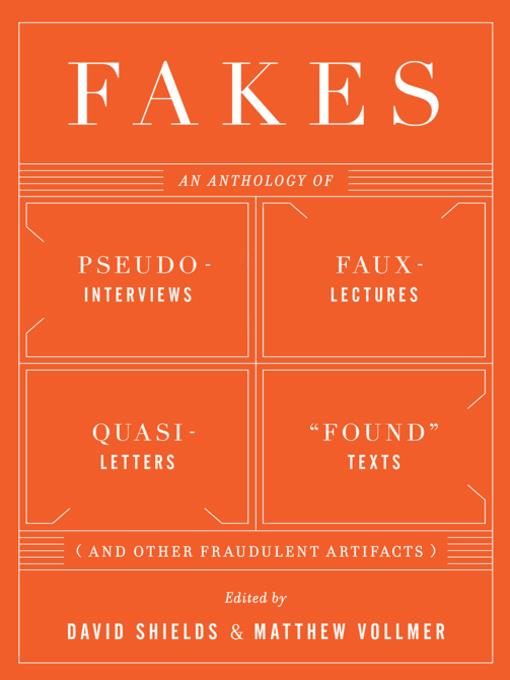
Fakes
An Anthology of Pseudo-Interviews, Faux-Lectures, Quasi-Letters, "Found" Texts, and Other Fraudulent Artifacts
- اطلاعات
- نقد و بررسی
- دیدگاه کاربران
نقد و بررسی

August 20, 2012
Cleverness abounds in the 40 subversions of terms of service, disclaimers, how-to manuals, self-help books, catalogue copy, legal documents, and other quotidian genres. The editors have found some gems, such as Lorrie Moore's hilarious and moving "How to Become a Writer" (which begins: "First, try to be something, anything, else") and Amy Hempel's deeply ironic letter to the New York City Parking Violations Bureau contesting a ticket. In "This Is Just to Say That I'm Tired of Sharing an Apartment with William Carlos Williams," Laura Jayne Martin supplies a laugh-out-loud gloss on one of the celebrated poet's most famous imagist works. And Kari Anne Roy's "Chaucer Tweets the South by Southwest Festival" ("Wat ho, goatee'd man? Thy skinnee genes hath byrn'd my corneyas") is hilarious. Some pieces are surprisingly moving, such as Kevin Wilson's faux glossary "The Dead Sister Handbook: A Guide for Sensitive Boys" and Rick Moody's clever "Primary Sources," a bibliography with footnotes that examine the books, articles, and recordings that have impacted his life. But many go on too long. The joke of Jonathan Safran Foer's "About the Typefaces Not Used in This Edition" is mostly contained in the title. Like most anthologies, this one's hit or miss, though the hits are very good indeed.

September 1, 2012
A compendium of fictional satires, parodies and other attempts to transform commonplace forms into literary art. In his Reality Hunger (2010), co-editor Shields agitated for new forms of fiction that eschew standard-issue realism and integrate more of life as it's truly lived. The 40 pieces collected here, most published in the past two decades, represent one subgenre of experimentation, showcasing tweaks of everyday documents like interviews, how-to guides, academic papers and more. Many are comic pieces that shed light on the restrictiveness of the form being mocked. Jack Pendarvis' "Our Spring Catalog," for instance, pokes fun at the hollow enthusiasm of book publishers' promotional blurbs, while George Saunders' "I CAN SPEAK!" ventriloquizes the soothing tone of customer-service letters--the story becomes more brilliantly absurd as the corporate functionary defends a contraption that purports to translate toddler-speak into English. This isn't strictly an assortment of send-ups, however. Daniel Orozco's "Officers Weep" uses the format of the police blotter to shift from just-the-facts crime listings to a glimpse into the force's existential musings. Charles Yu's "Problems for Self-Study" cleverly employs the language of story problems to illuminate a couple's connection and separation, while Charles McLeod's heartbreaking "National Treasures" encapsulates the narrator's hard-knock life in the form of an auction catalog. There are some ringers here--Lorrie Moore's "How to Become a Writer" doesn't truly tweak how-to language--while social-media riffs like Kari Anne Roy's "Chaucer Tweets the South by Southwest Festival" show that the form is still evolving as fodder for effective fiction. But in the aggregate, these stories suggest a few future directions for storytelling, and Shields and Vollmer (English/Virginia Tech; Future Missionaries of America, 2009) convincingly press the necessity of the task--these pieces represent "our oft-repressed language staging a rebellion." Other noteworthy contributors include Amy Hempel, Lydia Davis, Jonathan Safran Foer, Paul Theroux and Rick Moody. Some pieces rebel better than others, but there's ample inspiration for comic and serious fiction authors alike.
COPYRIGHT(2012) Kirkus Reviews, ALL RIGHTS RESERVED.

September 1, 2012
In his latest anthology, innovative Shields (Reality Hunger, 2010; The Inevitable, 2011) joins forces with writer Vollmer to prove that creative use of form can be a delightful way to tell stories. Some pieces are less successful than others, for example, Chaucer Tweets the South by Southwest Festival. But with such contributors as Ron Carlson, Amy Hempel, and Rick Moody, the successes are wonderful. A personal ad tells the story of an entire lifelong relationship, from high school to deathbed. An auction catalog uncovers the painful details of a man's attempts to cope with his brother's suicide. An irreverent last will and testament gradually portrays a lonely eccentric reaching out to a list of potential executors, chosen from the phone book almost at random. And a found index hilariously connects the dots of the life of HRH, a man who seemed to have his hand in almost every major event of the twentieth century. Together, these imaginative short stories demonstrate how much plot, character, and feeling can be revealed in documents and ephemera we consider dull and routine.(Reprinted with permission of Booklist, copyright 2012, American Library Association.)




دیدگاه کاربران